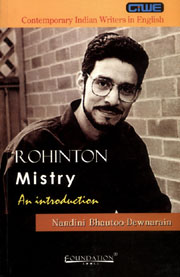Book contents
- Frontmatter
- Contents
- Series Editor's Preface
- 1 Introduction
- 2 The Local and the Universal
- 3 ‘Otherness’ in Mistry
- 4 Politics in Mistry's Fiction
- 5 Recurring Themes
- 6 Rohinton Mistry and Indian Writing in English
- Topics for Discussion
- Appendix A The 1975 Emergency
- Appendix B MISA
- Appendix C The History of the Bangladesh Conflict
- Appendix D List of Honours and Awards
- Bibliography
Appendix A - The 1975 Emergency
Published online by Cambridge University Press: 05 November 2011
- Frontmatter
- Contents
- Series Editor's Preface
- 1 Introduction
- 2 The Local and the Universal
- 3 ‘Otherness’ in Mistry
- 4 Politics in Mistry's Fiction
- 5 Recurring Themes
- 6 Rohinton Mistry and Indian Writing in English
- Topics for Discussion
- Appendix A The 1975 Emergency
- Appendix B MISA
- Appendix C The History of the Bangladesh Conflict
- Appendix D List of Honours and Awards
- Bibliography
Summary
In the history of India, a State of Emergency has been proclaimed three times since Independence (1947): the first time in 1962 during the Chinese Aggression, the second time in 1971 during the Bangladesh War and the third time from 1975 to 1977 to stem political opposition to Indira Gandhi. It is this last one that figures in A Fine Balance.
In 1975, the Allahabad High Court declared Indira Gandhi guilty of election malpractices. Jayaprakash Narayan, who had broken away from the Congress, announced a national agitation campaign to demand her resignation. On 27 June 1975, Mrs Gandhi declared a State of Emergency. This Emergency gave the President full powers to handle what was said to be a right-wing conspiracy that supposedly included calls to the military to revolt which aimed at preventing the democratically elected government from functioning. Top leaders were arrested, including Jayaprakash Narayan and a number of his supporters within the Congress Party. Censorship of the press was imposed and public meetings and demonstrations were banned in most places throughout the country – those attempting to organize such meetings in protest against the Emergency were arrested.
All fundamental rights were strictly limited on the mere proclamation of Emergency under article 352 of the Constitution. It is estimated that during the Emergency more than 1,00,000 persons were jailed without trial. The next phase of destruction came in the guise of City Beautification projects which lead to massive demolition in certain cities. Thousands of people were displaced in the process.
- Type
- Chapter
- Information
- Rohinton MistryAn Introduction, pp. 116Publisher: Foundation BooksPrint publication year: 2006



